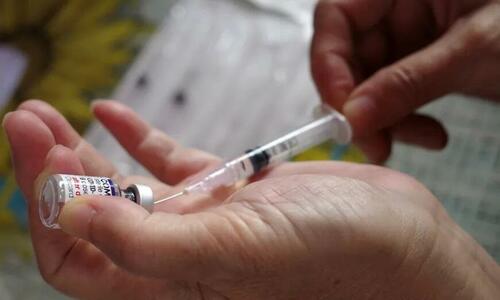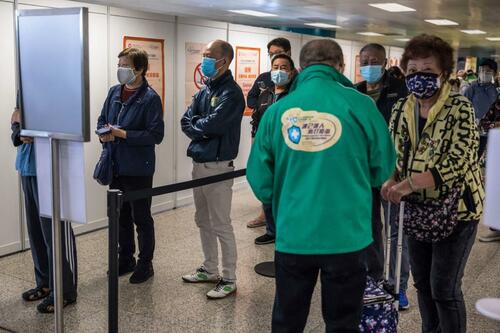
Authored by Zachary Steiber via The Epoch Times (emphasis ours),
Some children who experienced heart inflammation after COVID-19 vaccination had scarring on their hearts months later, a new long-term study found.
Researchers followed a group of 40 patients aged 12 to 18 for up to one year after the children were diagnosed with myocarditis, or heart inflammation, following vaccination with one of the messenger RNA shots from Pfizer or Moderna. They performed a series of tests, including echocardiograms.
Cardiac magnetic resonance imaging, or cardiac MRIs, was performed on 39 of the 40 patients. Abnormal results came in for 26 of those who were imaged, including 19 who had late gadolinium enhancement, or signs of scarring.
The patients with abnormal results returned for follow-up cardiac MRIs at least five months after the initial tests and 15, or 58 percent, had residual late gadolinium enhancement (LGE). The one patient without an initial scan also had mild late gadolinium enhancement when scanned during a follow-up visit.
“Persistence of LGE in a significant subset of patients with up to 1 year of follow-up was observed,” Dr. Yiu-fai Cheung, with Hong Kong Children’s Hospital, and the other researchers wrote.
They said that the implications of the persistence remain unclear, but that given it is an indicator of subclinical heart dysfunction and scarring, “there exists a potential long-term effect on exercise capacity and cardiac functional reserve during stress.”
The study was published by Circulation. Authors reported no funding or disclosures.
Dr. Peter McCullough, an American cardiologist and president of the McCullough Foundation, said that the new data is consistent with what cardiologists are seeing in clinical practice.
“Serious cases of COVID-19 vaccine induced myocarditis are not resolved by cardiac MRI at one year of followup in the majority of cases. At some point, we must assume that late gadolinium enhancement represents a scar or permanent damage,” Dr. McCullough, who was not involved in the research, told The Epoch Times via email.
“COVID-19 vaccines should be pulled from the market immediately until further notice. Large scale research programs should be commissioned immediately on subclinical and clinical COVID-19 vaccine induced myocarditis with initial aims at risk stratification and mitigation for cardiac arrest,” he added.
Dr. Anish Koka, another American cardiologist who was not involved in the study, said that the persistent LGE signifies a scar that replaced the initially inflamed heart muscle.
“The good news is that the amount of scar is small. The bad news is that there is scar,” Dr. Koka wrote on X, formerly known as Twitter.
Dr. Koka said that the level of scarring indicates there would likely not be a long-term impact, but that even small levels of scarring could be a foundation for future arrhythmias, with exercise serving as a trigger.
“All these kids (even those without scar) would need exercise stress tests at 6 months to attempt to prognosticate this,” Dr. Koka said.
Pfizer and Moderna did not respond to requests for comment on the study on myocarditis, a known side effect of both of the companies’ COVID-19 vaccines.

More Evidence
Myocarditis after COVID-19 vaccination was first detected in early 2021, and an increasing number of studies have undercut claims from officials in the United States that the heart inflammation is mild and resolves without treatment.
A study from the U.S. Centers for Disease Control and Prevention (CDC), published in 2022, reported that among patients with follow-up cardiac MRIs, 54 percent had at least one abnormal finding, such as scarring.
The study relied on surveys from health care providers who examined the patients.
The providers later told the CDC that five to 13 months after the initial diagnosis, 14 percent of patients were still not cleared for all physical activity, and that multiple patients still had abnormal cardiac MRI findings. And in a separate set of surveys, many patients reported experiencing one or more symptoms beyond one year.
Read more here...
Authored by Zachary Steiber via The Epoch Times (emphasis ours),
Some children who experienced heart inflammation after COVID-19 vaccination had scarring on their hearts months later, a new long-term study found.
Researchers followed a group of 40 patients aged 12 to 18 for up to one year after the children were diagnosed with myocarditis, or heart inflammation, following vaccination with one of the messenger RNA shots from Pfizer or Moderna. They performed a series of tests, including echocardiograms.
Cardiac magnetic resonance imaging, or cardiac MRIs, was performed on 39 of the 40 patients. Abnormal results came in for 26 of those who were imaged, including 19 who had late gadolinium enhancement, or signs of scarring.
The patients with abnormal results returned for follow-up cardiac MRIs at least five months after the initial tests and 15, or 58 percent, had residual late gadolinium enhancement (LGE). The one patient without an initial scan also had mild late gadolinium enhancement when scanned during a follow-up visit.
“Persistence of LGE in a significant subset of patients with up to 1 year of follow-up was observed,” Dr. Yiu-fai Cheung, with Hong Kong Children’s Hospital, and the other researchers wrote.
They said that the implications of the persistence remain unclear, but that given it is an indicator of subclinical heart dysfunction and scarring, “there exists a potential long-term effect on exercise capacity and cardiac functional reserve during stress.”
The study was published by Circulation. Authors reported no funding or disclosures.
Dr. Peter McCullough, an American cardiologist and president of the McCullough Foundation, said that the new data is consistent with what cardiologists are seeing in clinical practice.
“Serious cases of COVID-19 vaccine induced myocarditis are not resolved by cardiac MRI at one year of followup in the majority of cases. At some point, we must assume that late gadolinium enhancement represents a scar or permanent damage,” Dr. McCullough, who was not involved in the research, told The Epoch Times via email.
“COVID-19 vaccines should be pulled from the market immediately until further notice. Large scale research programs should be commissioned immediately on subclinical and clinical COVID-19 vaccine induced myocarditis with initial aims at risk stratification and mitigation for cardiac arrest,” he added.
Dr. Anish Koka, another American cardiologist who was not involved in the study, said that the persistent LGE signifies a scar that replaced the initially inflamed heart muscle.
“The good news is that the amount of scar is small. The bad news is that there is scar,” Dr. Koka wrote on X, formerly known as Twitter.
Dr. Koka said that the level of scarring indicates there would likely not be a long-term impact, but that even small levels of scarring could be a foundation for future arrhythmias, with exercise serving as a trigger.
“All these kids (even those without scar) would need exercise stress tests at 6 months to attempt to prognosticate this,” Dr. Koka said.
Pfizer and Moderna did not respond to requests for comment on the study on myocarditis, a known side effect of both of the companies’ COVID-19 vaccines.

More Evidence
Myocarditis after COVID-19 vaccination was first detected in early 2021, and an increasing number of studies have undercut claims from officials in the United States that the heart inflammation is mild and resolves without treatment.
A study from the U.S. Centers for Disease Control and Prevention (CDC), published in 2022, reported that among patients with follow-up cardiac MRIs, 54 percent had at least one abnormal finding, such as scarring.
The study relied on surveys from health care providers who examined the patients.
The providers later told the CDC that five to 13 months after the initial diagnosis, 14 percent of patients were still not cleared for all physical activity, and that multiple patients still had abnormal cardiac MRI findings. And in a separate set of surveys, many patients reported experiencing one or more symptoms beyond one year.
Read more here…
Loading…



